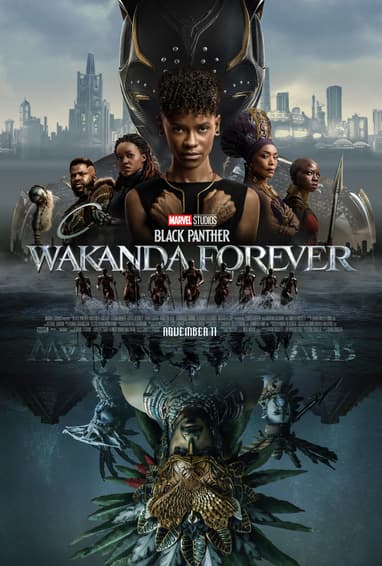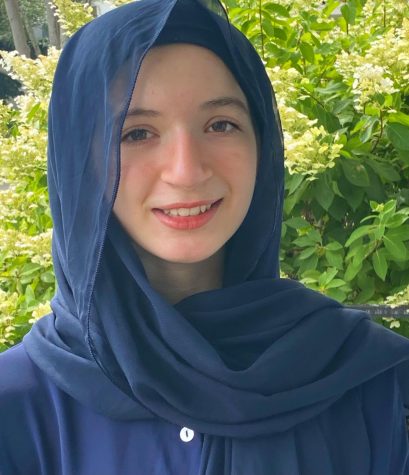Marvel’s ‘Wakanda Forever’ Honors the Legacy of Chadwick Boseman

www.marvel.com/movies/black-panther-wakanda-forever
A major theme in Wakanda Forever is women’s empowerment. The vast majority of the cast is female. From Okoye, general of the Dora Milaje, to Queen Ramonda, and even Riri Williams, the captured scientist, every female lead in the movie exhibits courage and a strong spirit.
In the shadow of the death of the incredible actor Chadwick Boseman in Aug. 2020, Marvel Studios released its new sequel, Black Panther 2: Wakanda Forever, on Nov. 11.
WARNING: SPOILERS AHEAD
Wakanda Forever continues the story of the first Black Panther movie, released in Feb. 2018. The sequel highlights the emotional journey of King T’Challa’s sister, Shuri, as she copes with her brother’s tragic death and faces a threat from the Talokan tribe.
The film opens with a highly emotional scene of Shuri working in her lab to save King T’Challa’s life as he struggles with an unspecified illness. When she does figure out a solution, though, it’s too late. Her mother, Queen Ramonda, approaches her, laden with grief, and informs her that her brother “is with the ancestors.”
Despite the fact that T’Challa is not even shown until somewhere in the middle of the movie, his memory lingers throughout the film, driving the other characters’ motives.
Namora, king of the underwater Talokan tribe, demands the Wakandans help his people capture an MIT student scientist who built a vibranium detector for the CIA.
To Namora, this was a sign that the powers on the surface world were seeking to take vibranium from the Talokan people. He plans to declare war upon the entire world, and he warns Wakanda that if they did not join him in his efforts to kill the scientist, they would be the first to fall.
Driven by the love of her people and the continuation of her brother’s legacy, Shuri battles with grief and the heavy responsibility of stabilizing Wakanda’s alliances with the outside world.
A major theme in Wakanda Forever is women’s empowerment. The vast majority of the cast is female. From Okoye, general of the Dora Milaje, to Queen Ramonda, and even Riri Williams, the captured scientist, every female lead in the movie exhibits courage and a strong spirit. I thoroughly enjoyed watching them shine and receive the recognition they deserved on-screen.
A challenge for the filmmakers was to pay tribute to Chadwick Boseman while still keeping the fourth wall intact for the film. The producers grappled with whether or not to recast Black Panther, and eventually, Director Ryan Coogler decided that it was too early to replace Boseman’s legacy within the MCU.
While I got dragged out of the theater before I could see the end credits scene, upon further research, Nakia reveals T’Challa’s son as having the same name as the king, and he is safely living in Haiti with his mother, shielded from the pressures of being king. Perhaps that was a foreshadowing of T’Challa Jr’s future involvement in the MCU.
Another outstanding aspect of the film was the depiction of African culture. Given the task of creating an entirely new African nation, Coogler expertly brought together elements from a variety of African cultures in order to create a fictionalized country free of Western colonization.
Wakanda essentially represents what African countries can be if they unite and liberate themselves from the oppressive forces of colonialism. In other words, Wakanda represents the ideal of what African nations have the capability of advancing to when left in peace.
In fact, Hannah Beachler, the production designer for Wakanda Forever, spent numerous months researching African cultures in order to draw inspiration for the production. Her ideas were so elaborate and well put-together that she was nominated for an Oscar.
As a member of a minority group that is often stereotyped by Hollywood, I was glad to see aspects of Wakandan culture interwoven through the film, including rituals, clothing and even languages.
One of the prime examples of this cultural representation was T’Challa’s funeral. Civilians were dressed in white, as were Queen Ramonda, Shuri and all other relatives of the king. Delicate white body paint lined their faces, and Shuri wore intricate horn earrings, symbolizing purity and the hope for the rebirth of their king into the ancestral realm. Wakandans danced and played music, a common ritual of celebrating life in African funerals.
One major tension in the film is between Shuri and her mother due to the void that T’Challa once filled. Ramonda repeatedly tries to connect emotionally to Shuri, who buries herself in her lab for comfort.
Eventually, Shuri travels to Haiti to perform the ritual her mother recommended would help her heal from the loss of her brother. She cries, and her mind is filled with memories of T’Challa. This was the one scene in which I actually had to choke back tears.
Another strong relationship Shuri builds is with king Namor. Both rulers wish the best for their people while dealing with personal loss and inner turmoil. Shuri becomes the first person to witness the underwater kingdom of Talokan, and she is struck with awe at its beauty.
That portion of the movie plays an important role in showing that Namor wasn’t necessarily the villain in the movie, as he was just trying to protect the kingdom he had worked so hard to develop.
Some fans speculate something more growing between the two, but the actor who played Namor, Tenoch Huerta, clarified that the connection they had was purely humane and one of respect, a conclusion that I agree with. Given the already heavy emotional weight of the film, forcing some kind of an underdeveloped romance does not seem practical to introduce from the getgo of the two characters’ interaction. Nevertheless, the complexity of the characters built by Ryan Coogler and his co-writer Joe Robert Cole is highly impressive.
I was surprised to learn how Huerta was offered his role for Namor. According to recent interviews, Huerta was working on another film when he received a call from Coogler asking if he wanted to be involved in the Black Panther sequel. Before Coogler could say more, his screen froze out for five minutes and Huerta heard nothing of the role.
Once he unfroze, Coogler offered him the position and he agreed. If this isn’t comical enough, when asked if he knew how to swim for a literal underwater character, Huerta simply claimed, “I’ve never drowned”. Since he really didn’t know how to swim, Huerta assumed it would be best to say yes and look into the role later. Fortunately, he received swimming lessons before the filming of the movie and performed outstandingly.
Angela Bassett was a classic and dignified act in the role of Queen Ramonda. Bassett has performed in over 50 roles in her career, and her mastery of the craft is reflected in the way she developed her character.
Playing such an emotionally-weighted queen is clearly a demanding task, but in spite of her short time on film, Bassett made a remarkable impact. Many have speculated that she will win awards for this role, but Bassett is unfazed.
“You don’t do these jobs for the awards,” she told Variety.
What seems to be a bigger priority to Bassett is the portrayal of her African descent and the emotional messages that came along with it. In one scene in particular, she strips General Okoye of her role as head of the Dora Milaje after Shuri has been lost to the Talokan tribe.
It’s an intense scene, with Okoye slamming her spear into the ground as a way of giving up her title and Queen Ramonda responding icily.
“I am queen of the most powerful nation in the world. My entire family is gone. Have I not given enough?” she asked.
Her rhetorical question draws attention to the loss she had to suffer and the challenge of posing a brave face in front of her people in spite of all. Bassett’s skill in playing Queen Ramonda impacted me and showed me the struggles of royalty that suffer with loss. She deserves recognition for her incredible acting.
I thoroughly enjoyed watching Black Panther 2 in the theater. It was a truly riveting and awakening experience to experience the MCU’s take on grief and loss. The film had an action-filled and gorgeously developed plot. Whether or not you are a fan of the MCU, if you haven’t already seen it, I absolutely recommend watching the film.
Wakanda Forever.

Anah Khan (she/hers) started writing for the Beachcomber in 2021. She is interested in covering new organizations and programs in BHS and writing opinion...









